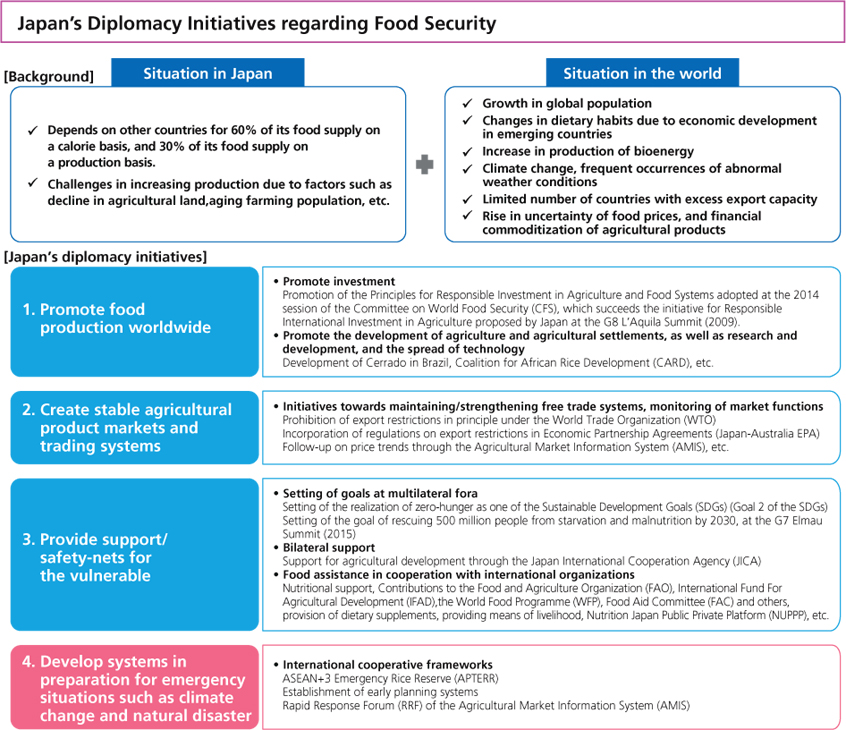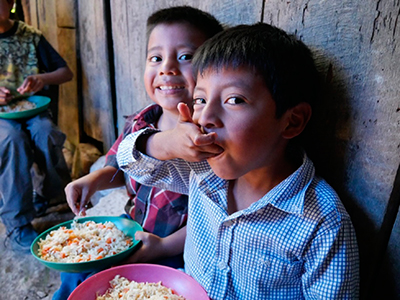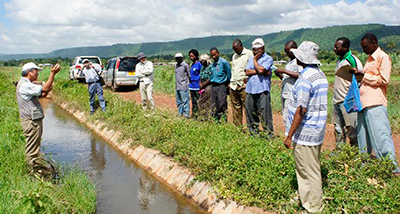(8) Food Security and Nutrition
The number of chronically undernourished people in the world is estimated at 821 million (one in nine people in the world) in 2017, according to the “2018 State of Food Security and Nutrition in the World” jointly published by the Food and Agriculture Organization of the United Nations (FAO), the International Fund for Agricultural Development (IFAD), the World Food Programme (WFP), the United Nations Children’s Fund (UNICEF), and the World Health Organization (WHO). Although the number of chronically undernourished people had been on a declining trend for more than 10 years until 2014, the trend was reversed in 2015 and has since continued to rise. In order to achieve Goal 2 of the Sustainable Development Goals (SDGs), “End hunger, achieve food security and improved nutrition, and promote sustainable agriculture,” it is vital to put in greater effort. Furthermore, climate change and extreme weather phenomenon in recent years have given rise to severe food crisis, making it one of the important factors leading to the recent increase in the starving population. Hence, there are calls around the world to accelerate and expand action toward strengthening resilience and adaptability (see here for details on “Issues regarding Climate Change”).
In order to achieve food security (a state where all people, at all times, can access sufficient, safe and nutritious food), there is a need for multifaceted measures based on international coordination. These measures include not only a sustainable increase in the production of food, but also improvement of nutrition, establishment of a social safety net (a mechanism in which people can live safely with peace of mind), provision of necessary food assistance, and implementation of countermeasures against infectious diseases among livestock. Nutrition improvement during the first 1,000 days from pregnancy to second birthday is particularly seen as important as it has a significant impact on the child’s growth thereafter.
■Japan’s Efforts
Japan proactively addresses global food security issues, giving priority to cooperation that develops agriculture, forestry and fisheries, including the development of food value chains. In the short term, Japan provides food assistance to developing countries to avert food shortages, and in the medium to long-term, it aims to help increase and improve agricultural production and productivity in developing countries in order to prevent and eliminate the causes of food-related problems including hunger. Specifically, Japan uses its knowledge and experience to strengthen research and technology development, along with capacity-building in disseminating this technology in a way that is suited to the cultivation environment, promote the sustainable use of fishery resources, strengthen organizations of farmers, assist in policymaking, as well as to improve infrastructure such as irrigation facilities, farm roads, and fishing ports.
●Efforts to Provide Food Assistance and Improve Nutrition
Japan is providing food assistance based on requests from developing countries confronting food shortages. In FY2017, Japan contributed a total of ¥5.87 billion as bilateral food assistance in 16 countries, and provided approximately 80,000 tons of grains (rice, wheat flour, etc.) which mainly include Japanese government rice. In 2018, Japan served as the chair of the Food Aid Committee, which comprises of all the Parties of the “Food Assistance Convention.”


Children taking nutritionally-balanced meals in Santa Maria, La Paz, located in the western part of Honduras. Nutritional guidance was provided to residents as a project under the Inter-American Development Bank (IDB) and the Japanese Funds-in-Trust (JPF). (Photo: Hidemi Kibe/Embassy of Japan in Honduras)
Japan, in cooperation with international organizations, is also engaged in efforts to provide food assistance from the perspective of preventing the occurrence and recurrence of conflicts, which is a cause of starvation. For example, through WFP, Japan implements measures such as emergency food assistance, school feeding programs to improve access to education, and food assistance encouraging people, through the distribution of food, to participate in the development of agricultural land and social infrastructure in order to support the self-reliance of local communities. In 2017, WFP conducted activities including the distribution of approximately 3.8 million tons of food to 91.4 million people in 83 countries around the world. In 2018, Japan contributed a total of $132.4 million to WFP projects. Furthermore, Japan has provided assistance in technical cooperation for the agricultural and rural development of developing countries, establishment of international standards and norms in the food and agriculture fields, and the development of statistics, etc. through FAO. In addition, Japan also provides support for research on the variety development conducted by the Consultative Group on International Agricultural Research (CGIAR), which is comprised of 15 agricultural research centers, and facilitates cooperation through exchanges among researchers. Moreover, Japan provides support for developing countries to enhance their own food safety. In this area, concerning transboundary zoonotic diseases such as foot-and-mouth disease, Japan is reinforcing countermeasures in the Asia-Pacific region, in cooperation with the World Organisation for Animal Health (OIE) and FAO, and has created the Global Framework for Progressive Control of Transboundary Animal Diseases (GF-TADs), among other efforts.
As for initiatives for nutritional improvement, in addition to bilateral assistance for the promotion of breastfeeding and the training of health professionals, Japan also provides assistance through multilateral cooperation by contributing to organizations such as UNICEF and WFP. Japan also participates in the international nutritional improvement initiative, Scaling Up Nutrition (SUN) as a donor country. In recent years, Japan is also putting effort into promoting nutritional improvement programs in collaboration with private companies, and launched the Nutrition Japan Public Private Platform (NJPPP) in 2016. Through this platform, in cooperation with partners from private companies, civil society, and academic research institutions, Japan contributes to nutrition improvement specifically by creating an environment that can boost initiatives of Japanese food-related enterprises, etc. for nutritional improvement in developing countries. Additionally, Japan-led efforts for nutrition improvement have started in earnest including the launch of the “Initiative for Food and Nutrition Security in Africa (IFNA)” initiated by JICA with the aim of accelerating nutritional improvement in Africa. Japan also positions nutrition as an important fundamental area for the achievement of UHC. In 2020, Japan will host Tokyo Nutrition for Growth Summit 2020, and through this event, contribute to increasing international momentum for improving nutrition.
●Promotion of Agriculture, Forestry and Fisheries, and Development of Food Value Chains
Japan is promoting the establishment of a food value chain for developing countries through public-private partnership, based on the Global Food Value Chain Strategy formulated by the Ministry of Agriculture, Forestry and Fisheries (MAFF) in June 2014. In FY2017, based on this Strategy, Japan organized bilateral policy dialogues with the Philippines, Russia, Brazil, India, Cambodia, Myanmar, Argentina, and Australia. In the dialogue held with Viet Nam in April 2018, the two countries agreed on revising the Medium- to Long-Term Vision for Japan-Viet Nam Agricultural Cooperation, and on cooperating toward the utilization of standards and certifications for agricultural produce and food quality, with the aim of building a food value chain in Viet Nam.

As a part of the Project for Supporting Rice Industry Development in Tanzania, implemented in the irrigation area in the northern part of Tanzania, experts and members of water utilization associations exchange opinions about the importance of maintaining and managing irrigation channels (Photo: Cuthbert Kimaro)
Furthermore, with the aim of realizing food security and eradicating poverty in Africa, Japan places emphasis on agriculture as an industry that plays an important role in Africa’s economic growth, and contributes to its development. For instance, Japan supports the research of NERICA* (New Rice for Africa), a cross-breed between Asian rice and African rice, and the spread of its production techniques, as well as support for increasing rice production based on the Comprehensive Africa Agriculture Development Programme (CAADP). Moreover, at the Fourth Tokyo International Conference on African Development (TICAD IV) held in 2008, Japan established the Coalition for African Rice Development (CARD)*, and announced the CARD Initiative. Since then, Japan has established the goal of doubling rice production in Sub-Saharan Africa from 14 million tons as of 2008 to 28 million tons by 2018. As a matter of fact, the annual rice production in Sub-Saharan Africa had increased to 26.11 million tons by 2016, meaning that approximately 93% of the targeted increase in production has been achieved.
Moreover, in order to promote the transition from self-sufficiency to profitable agriculture, on the occasion of the Sixth Tokyo International Conference on African Development (TICAD VI) held in 2016, Japan announced that it would transfer rice cultivation skills to 60,000 farmers and 2,500 extension workers by 2018 under the CARD initiative in order to strengthen food security in Africa, and that it would promote market-oriented agriculture and provide support for developing the food value chain, from the perspective of reducing post-harvest loss*, promoting the food production industry, and improving incomes in agricultural communities. Since 2016, Japan has provided training for 30,393 people (60,381 people since 2013) through the Smallholder Horticulture Empowerment & Promotion (SHEP) approach*, toward the promotion of market-oriented agriculture, as well as transferred rice cultivation skills through CARD to more than 50,000 people.
In response to requests for greater cooperation in the agricultural field, put forth by the respective countries at TICAD VI, Japan has also launched a platform that connects African countries and the local sites. Based on this platform, Japan dispatched three experts from May 2018 to carry out the transfer of outstanding agricultural technology and advance human resources development. At the same time, they are also engaged in promoting excellent projects in the field of agriculture.
●Food Security through a Multilateral Cooperation Approach
Japan proposed the “Responsible Agricultural Investment (RAI)”* initiative at the G8 L’Aquila Summit (Italy) in 2009. With the growing problem of large-scale agricultural investments in developing countries (acquisition of agricultural lands by foreign investors) in response to rising international food prices, this initiative aims to coordinate and maximize profits for the three parties—host country government, local people, and investors—while easing the negative impact of agricultural investment and promoting agricultural development in the country of investment. Based on this concept, the Principles for Responsible Investment in Agriculture and Food Systems (CFS-RAI), for which discussions had been held at the Committee on World Food Security (CFS), supported by a secretariat comprising the Food and Agriculture Organization (FAO), the International Fund for Agricultural Development (IFAD), and the World Food Programme (WFP), were adopted at the 41st CFS Session in 2014. In 2018, the ASEAN-RAI Guidelines were adopted by the ASEAN secretariat as the regional version of the CFS-RAI.
With regard to the New Alliance for Food Security and Nutrition, which was established at the G8 Camp David Summit (the United States) in 2012, it has been operating autonomously under the New Alliance secretariat of the African Union Commission (AUC), and now has ten partner countries. In addition, under the framework of the New Alliance, the relevant international organizations are implementing the “Forward-looking research and analysis programme for responsible agricultural investment” with financial support from Japan.
Furthermore, Japan has been involved in initiatives such as providing assistance to the Agricultural Market Information System (AMIS)* in the G20, which aims to enhance the transparency of the international agricultural market. Through this inter-organizational platform launched in 2011 by the G20 as a measure to counter the wild fluctuations of food prices, the G20 member countries, major importing and exporting countries, corporations, and international organizations participate in a system for sharing information on the agricultural and food market (such as production volumes and prices) in a timely, accurate, and transparent manner. Japan has provided support for efforts in ASEAN countries to improve the accuracy of agricultural statistical information of ASEAN countries that will be utilized as AMIS data. In addition, Japan provides assistance in the agricultural sector through international organizations such as FAO, IFAD, a global research partnership for a food-secure future (CGIAR), and WFP.
- * New Rice for Africa (NERICA)
- NERICA is a general term for rice developed in 1994 by the Africa Rice Center (formerly West Africa Rice Development Association [WARDA]) through the hybridization of high-yield Asian rice with African rice, which is resistant to weeds, diseases and insect pests. In order for NERICA to suit the natural conditions of each region in Africa, they are characterized by (i) a higher yield, (ii) a shorter growth period, (iii) higher resistance to dryness (drought), and (iv) higher resistance to diseases and insect pests than conventional rice. Since 1997, Japan has partnered with international organizations and NGOs to provide support for research and development related to new types of NERICA, test cultivation, and increased production and popularization of seeds. In addition, Japan has dispatched agricultural experts and JOCVs to offer cultivation training, and has also accepted trainees from Africa for training in Japan.
- *Coalition for African Rice Development (CARD)
- CARD is a consultative group composed of donor countries, African regional organizations, and international organizations, partnered with rice-producing countries in Africa that are interested in rice production and development.
- *Post-harvest loss
- Post-harvest loss refers to harvested food that is discarded because it is unable to fulfill its originally intended purpose (for use as food, etc.). This can be caused by improper harvest timing, and overexposure to rain or dryness, extremely high or low temperatures, germ contamination, or any other physical damage that reduces the value of the products due primarily to a lack of adequate storage facilities.
- *Smallholder Horticulture Empowerment Project (SHEP) approach
- The SHEP approach refers to an effort to assist smallholder farmers to enhance their agricultural organizations through training and research on local markets, and to provide guidance on cultivation techniques and development of agricultural roads while taking into account gender issues, in order to help them improve their capacities to manage their market-oriented agricultural businesses. Japan is supporting the adoption of SHEP in Africa.
- *Agricultural Market Information System (AMIS)
- AMIS was launched as a countermeasure against food price volatility by the G20 in 2011. It allows each of the G20 members, the main exporting and importing countries, companies, and international organizations to share agricultural and food market information (production output, price, etc.) in a timely, precise, and transparent manner. Japan has supported the efforts of ASEAN countries aimed at improving the accuracy of ASEAN statistical information on agriculture used as AMIS data.
